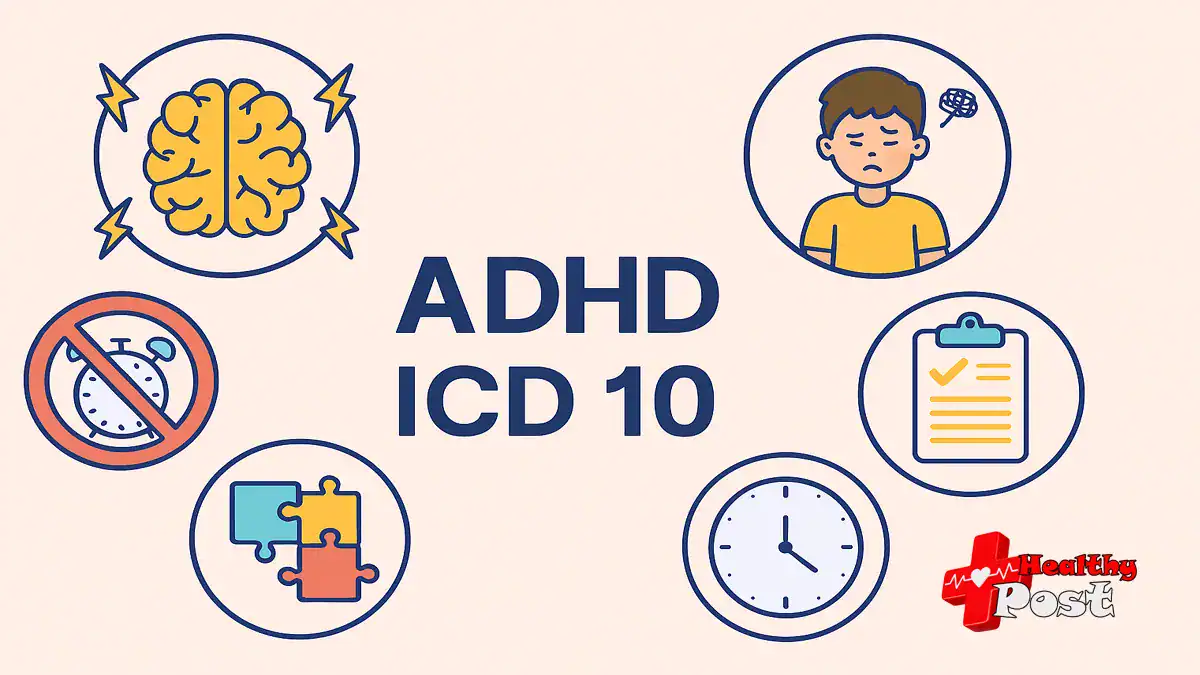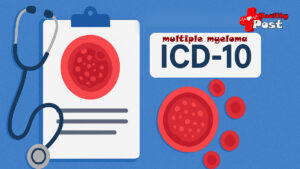
5 Proven Insights Into ADHD ICD 10 That Simplify Diagnosis
Attention-deficit hyperactivity disorder (ADHD) is the most common neurodevelopmental disorders affecting both adult and children. With growing awareness and research about ADHD, accurate diagnosis is more important than ever. One of the most critical tools in ADHD diagnosis is the ICD 10 code for ADHD—a standardized system use by healthcare professionals to categorize medical conditions. If you’re looking to understand how the ADHD ICD 10 code works and how it simplifies diagnosis, you’ve come to the right place!
In this article, we’ll explore five proven insights into ADHD ICD 10 that will help demystify the diagnostic process and shed light on how this system makes ADHD identification easier, more accurate, and more consistent.
1. ICD 10 Code for ADHD: The Global Standard for Diagnosis
The ICD 10 ADHD coding system is use worldwide by healthcare providers to classify and diagnose ADHD. Understanding this system is the first step to demystifying the process of ADHD diagnosis.
What Is the ICD 10 ADHD Code?
The ICD 10 code for ADHD refers to a specific identifier in the International Classification of Diseases (ICD) system, which is use by doctors, hospitals, and clinics to diagnose and categorize medical conditions. In the case of ADHD, the relevant codes are:
- F90.0: ADHD, predominantly inattentive type
- F90.1: ADHD, predominantly hyperactive-impulsive type
- F90.2: ADHD, combined type (inattention and hyperactivity/impulsivity)
These codes help healthcare professionals easily categorize the type of ADHD a patient might have based on their symptoms. Using these codes not only simplifies the diagnosis but also ensures consistency across medical professionals worldwide.
How It Simplifies Diagnosis
The ICD 10 code for ADHD helps streamline the diagnostic process by providing a clear, uniform language for medical professionals to use. Without such a coding system, diagnosing ADHD could be far more subjective, potentially leading to misdiagnosis or inconsistent treatment plans. These codes allow for a standardized approach, ensuring that no matter where a person seeks care, they will receive the same diagnostic consideration.
2. ICD 10 ADHD Code Promotes Clear Communication Among Providers
Clear communication between healthcare providers is essential for accurate diagnosis and effective treatment planning. The ICD 10 ADHD code ensures that different healthcare professionals—whether they’re pediatricians, psychologists, or neurologists—are on the same page regarding a diagnosis.
Collaboration Made Easy
When a child or adult is refer for ADHD evaluation, they may see multiple healthcare providers, such as a family doctor, specialist, or psychologist. The ICD 10 code for ADHD makes it easier for these professionals to communicate, as it provides a common language for them to describe the patient’s condition. For example, a child diagnosed with F90.0 (ADHD, predominantly inattentive type) will have this code clearly indicated in their medical records, which can be share between their pediatrician, therapist, and school counselor.
This streamlined communication leads to better-informed decisions regarding treatment, medication, and behavioral therapy. It helps to reduce the chances of receiving conflicting information or treatment plans from different professionals.
3. Improved Documentation and Tracking of ADHD Cases
Another significant benefit of the ICD 10 ADHD system is that it enhances the accuracy of medical records. Proper documentation is essential for long-term care and monitoring of ADHD, and the ICD 10 system facilitates this process.
Consistent Record-Keeping
Using the ICD 10 code for ADHD ensures that patients’ medical histories are accurately recorded. This coding allows doctors and therapists to track the progression of ADHD symptoms over time, determine the effectiveness of different treatments, and make data-driven decisions about adjusting medications or interventions.
For example, a patient who is diagnose with F90.1 (ADHD, predominantly hyperactive-impulsive type) may later show signs of other symptoms, such as inattention, which could lead to a revised diagnosis of F90.2 (combined type). By maintaining a clear record of these changes, healthcare providers can offer better continuity of care.
Helps with Insurance and Billing
The ICD 10 ADHD code also plays an essential role in insurance claims and billing. Health insurance companies require these codes to process claims for ADHD-related treatments. By having a standardized coding system, it ensures that ADHD treatments are properly cover, preventing delays in treatment and claims processing.
4. The ICD 10 System Helps Differentiate ADHD from Other Conditions
A crucial insight into the ICD 10 code for ADHD is how it helps differentiate ADHD from other conditions that may share similar symptoms. ADHD is a complex disorder, and it can be easily confused with other issues, such as anxiety, depression, or learning disabilities.
ADHD vs. Other Conditions
The ICD 10 ADHD codes allow healthcare providers to distinguish ADHD from other mental health disorders or medical conditions. For instance, F90.9 (ADHD, unspecified type) could be used if a doctor is uncertain about the ADHD subtype, but additional assessment and tests can clarify whether the patient’s symptoms are due to ADHD or another issue.
By using the ICD 10 code for ADHD, doctors are able to classify the disorder more specifically, which in turn helps avoid misdiagnosis. Here are some ways the ICD 10 system helps to make this differentiation:
- Inattention vs. anxiety or depression: While anxiety or depression may lead to concentration issues, ADHD symptoms are often chronic and affect several areas of life, including school, work, and relationships.
- Hyperactivity vs. behavioral disorders: Hyperactivity is a hallmark of ADHD but could also indicate a behavioral issue. The ICD 10 system ensures that hyperactivity is classified alongside inattention or impulsivity when ADHD is diagnosed.
By clearly identifying ADHD, the ICD 10 code for ADHD can prevent misdiagnosis and ensure that individuals receive the most appropriate care.
5. ICD 10 ADHD Code Enables Better Long-Term Monitoring and Support
ADHD is a lifelong condition that requires ongoing management and support. The ICD 10 code for ADHD plays an essential role in the long-term care of those diagnosed with the disorder, particularly when it comes to monitoring the effectiveness of treatments and interventions.
Facilitates Ongoing Support
Because ADHD symptoms often change over time, it’s essential for healthcare providers to have a system in place for monitoring a patient’s condition. The ICD 10 ADHD system ensures that any adjustments in the diagnosis or treatment plan are clearly documented. For example, a person who initially shows only hyperactive symptoms may later develop issues with inattention. The ICD code can be updated accordingly to reflect these changes, ensuring that the treatment plan remains relevant.
Long-Term Care Plans
The ICD 10 code for ADHD also allows doctors to set long-term care plans, especially for patients transitioning from childhood to adulthood. As ADHD symptoms may present differently in adult life, having the ICD 10 ADHD code in their medical history makes it easier to adjust treatments, such as transitioning from pediatric medications to adult prescriptions or therapies.
Conclusion: Empowering Individuals and Professionals with the ICD 10 System
In summary, the ADHD ICD 10 system is a valuable tool that simplifies the diagnosis and management of ADHD. By providing a standardized, clear, and reliable way to classify ADHD, the ICD 10 code for ADHD ensures better communication, more accurate diagnoses, and more effective long-term care. It not only helps healthcare providers make more informed decisions but also empowers individuals and their families by offering a clearer path to understanding and managing ADHD.
Whether you’re a healthcare professional, a parent, or someone navigating ADHD, knowing how the ICD 10 ADHD code works can help demystify the diagnostic process and lead to better outcomes. If you or a loved one is struggling with ADHD, don’t hesitate to seek out a professional who is well-versed in this system to ensure that you receive the most accurate diagnosis and appropriate treatment.
In the end, the ICD 10 ADHD code doesn’t just simplify the process; it paves the way for a better understanding of ADHD, bringing hope and clarity to individuals at every stage of their ADHD journey.

